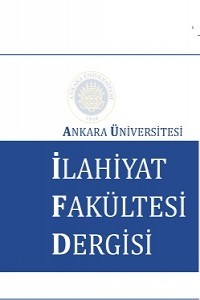El-Fārābī’de Tanrı ve nihailik
Tanrı hakkındaki en temel ontolojik/metafiziksel sezgilerimizden biri O’nun tüm gerçekliğin nihai kaynağı/temeli ve nihai nedensel açıklaması olduğudur. Nihailik düşüncesinin makul bir Tanrı tasavvuru için gerekli olduğu düşünülmekle birlikte yeterli olduğunu söylemek zor görünmektedir. Bunun en önemli nedenlerinden biri nihailik kavramının içeriksel bir tasavvur sunmaktan uzak görünmesidir. Bu çalışmada, nihailik kavramının uygun ve tatmin edici bir Tanrı anlayışı geliştirebilmek için yeterli olup olmadığı tartışması el-Fārābī’’nin İlk Neden düşüncesi üzerinden yapılmaktadır. El-Fārābī Tanrı’nın ne olduğuna ilişkin olarak O’na birtakım sıfatlar atfetmekle birlikte bunları nihailik düşüncesi çerçevesinde izah etmeye çalışır. Ancak nihailiğin biçimsel bir çerçeveyle sınırladığı bir Tanrı anlayışı tatmin edici görünmediği gibi teizmin Tanrı anlayışıyla da pek bağdaşmamaktadır. Teizmin mükemmellik kavramını esas alarak oluşturduğu Tanrı anlayışı nihailiği gerektirmekle birlikte onunla sınırlı kalmayıp içeriksel bir anlayış ortaya koymaktadır. Bu nedenle el-Fārābī’nin Tanrı ve nihailik anlayışının teizmin anlayışından önemli ölçüde ayrıştığı dikkate alındığında onun İlk Neden düşüncesinin teizmin Tanrı anlayışıyla bağdaşmayacağını savunmak mümkün görünmektedir
Anahtar Kelimeler:
Nihailik, el-Fārābī, İlk Neden, İlk Varlık, Tanrı, Mükemmellik, Teizm
God and Ultimateness in al-Fārābī
God and Ultimateness in al-Fārābī One of our basic ontological/metaphysical intuitions about God is the idea that God is the ultimate ground and ultimate causal explanation of all reality. However the idea of ultimateness is considered as necessary for a reasonable conception of God, it is hard to claim that this necessary condition is a sufficient one as well. One of the reasons for this is that the concept of ultimateness is far from providing a substantional conception. This paper discusses whether or not the concept of ultimateness is sufficient to constitute an appropriate and satisfactory conception of God with respect to al-Fārābī’s idea of the First Cause. In order to explain the nature of God, al-Fārābī ascribes some attributes to God, and he explains these attributes within the framework of ultimateness. However, as the conception of God, which is limited by this formal framework, does not seem satisfactory, it also does not seem compatible with the theistic concept of God. In contrast to al-Fārābī’s idea of the First Cause, the theistic conception of God is developed by the concept of perfection, and it does not only implies ultimateness but also puts forward a substantional idea of God. Given the fact that al-Fārābī’s understanding of God and ultimateness differs from theism’s understanding significantly, it seems possible to claim that al-Fārābī’s idea of the First Cause/God is not compatible with the theistic idea of God
Keywords:
Ultimateness, al-Fārābī, First Cause, First Being, God, Perfection, Theism,
___
- Wildman, Wesley J. “Ground-of-Being Theologies,” Philip Clayton ve Zachary Simpson (ed.), The Oxford Handbook of Religion and Science (Oxford: Oxford University Press, 2009) içinde, ss.612-632.
- Walbridge, John. God and Logic in Islam: The Caliphate of Reason. New York: Cambridge University Press, 2011.
- Türker, Ömer. “Metafizik: Varlık ve Tanrı,” M. Cüneyt Kaya (ed.), İslam Felsefesi: Tarih ve Problemler (İstanbul: İSAM Yayınları, 2011) içinde, ss.603-654.
- Sheikh, M. Saeed. Islamic Philosophy. Londra: The Octagon Press, 1982.
- Shehadi, Fadlou. Metaphysics in Islamic Philosophy. Delmar: Caravan Books, 1982.
- Reisman, David C. “Fârâbî ve Felsefe Müfredatı,” Peter Adamson ve Richard C. Taylor (ed.), İslam Felsefesine Giriş, terc. M. Cüneyt Kaya (İstanbul: Küre Yayınları, 2007) içinde, ss.66-67.
- “Plotinus: Tanrı’nın Birliği ve Basitliği Üzerine,” Ankara Üniversitesi İlahiyat Fakültesi Dergisi 51:1 (2010), ss.59-78.
- Reçber, Mehmet Sait. “Fârâbî ve Tanrı’nın Basitliği Meselesi,” Fehrullah Terkan ve Şenol Korkut (ed.), Uluslararası Fârâbî Sempozyumu Bildirileri: Ankara, 7-8 Ekim 2004 (Ankara: Elis Yayınları, 2005) içinde, ss.213-227.
- O’Connor, Timothy. Theism and Ultimate Explanation: The Necessary Shape of Contingency. Oxford: Blackwell Publishing, 2012.
- Menn, Stephen P. “Metaphysics: God and Being,” A. S. McGrade (ed.), The Cambridge Companion to Medieval Philosophy (Cambridge: Cambridge University Press, 2003) içinde, ss.147-170.
- Kılıç, Cevdet. İslam Düşüncesinde Bir Metafiziği ve Fârâbî’nin el-Vahid ve’l-Vahde İsimli Eseri. Ankara: Fecr Yayınları, 2014.
- Kaya, M. Cüneyt. Varlık ve İmkân: Aristoteles’ten İbn Sînâ’ya İmkânın Tarihi. İstanbul: Klasik Yayınları, 2011.
- Janos, Damien. Method, Structure, and Development in al-Fārābī’s Cosmology. Leiden: Brill, 2012.
- Hick, John. Disputed Questions in Theology and the Philosophy of Religion. Londra: Macmillan, 1997.
- Hammond, Robert. The Philosophy of Alfarabi and Its Influence on Medieval Thought. New York: The Hobson Book Press, 1947.
- Gerson, Lloyd P. God and Greek Philosophy: Studies in the Early History of Natural Theology. Londra: Routledge, 1990.
- el-Ġazālī, Ebū Ḥāmid Muḥammed b. Muḥammed. Filozofların Tutarsızlığı. Terc. Mahmut Kaya ve Hüseyin Sarıoğlu. İstanbul: Klasik Yayınları, 2005.
- Galston, Miriam. “A Re-examination of al-Fārābī’s Neoplatonism,” Journal of the History of Philosophy 15:1 (1977), ss.13-32.
- Fakhry, Majid. Al-Fārābi, Founder of Islamic Neoplatonism: His Life, Works and Influence. Oxford: Oneworld Publications, 2002.
- Es-Siyāset ul-Medeniyye veya Mebādi’ ul-Mevcūdāt. Terc. Mehmet Aydın, Abdülkadir Şener ve M. Rami Ayas. İstanbul: Kültür Bakanlığı Yayınları, 1980.
- El-Medinetü’l Fâzıla. Terc. Nafiz Danışman. İstanbul: Milli Eğitim Bakanlığı Yayınları, 1989.
- Kitābu’s-Siyāseti’l-Medeniyye. Tah. Fevzī Mitrī Neccār. Beyrut: Dāru’lMeşriḳ, 1993.
- Kitābu Ārāʾi Ehli’l-Medīneti’l-Fāḍila. Tah. Albīr Naṣrī Nādir. Beyrut: Dāru’l-Meşriḳ, 1985.
- el-Fārābī, Ebū Naṣr Muḥammed b. Muḥammed. İhsâ’ül-Ulûm: İlimlerin Sayımı. Terc. . Ahmet Ateş. İstanbul: MEB Yayınları, 1989.
- Edwards, Paul. “The Cosmological Argument,” Donald R. Burrill (ed.), The Cosmological Arguments: A Spectrum of Opinion (New York: Doubleday & Company, Inc., 1967) içinde, ss.101-123.
- Druart, Thérèse-Anne. “Metafizik,” Peter Adamson ve Richard C. Taylor (ed.), İslam Felsefesine Giriş, terc. M. Cüneyt Kaya (İstanbul: Küre Yayınları, 2007) içinde, ss.359-382.
- Diller, Jeanine ve Asa Kasher (ed.). Models of God and Alternative Ultimate Realities. New York: Springer, 2013.
- “Fârâbî ve Bağdat Meşşâî Okulu,” M. Cüneyt Kaya (ed.), İslam Felsefesi: Tarih ve Problemler (İstanbul: İSAM Yayınları, 2011) içinde, ss.145-182.
- Aydınlı, Yaşar. Fârâbî’de Tanrı-İnsan İlişkisi. İstanbul: İz Yayıncılık, 2008.
- ISSN: 1301-0522
- Yayın Aralığı: Yılda 2 Sayı
- Başlangıç: 1952
- Yayıncı: ANKARA ÜNİVERSİTESİ > İLAHİYAT FAKÜLTESİ
